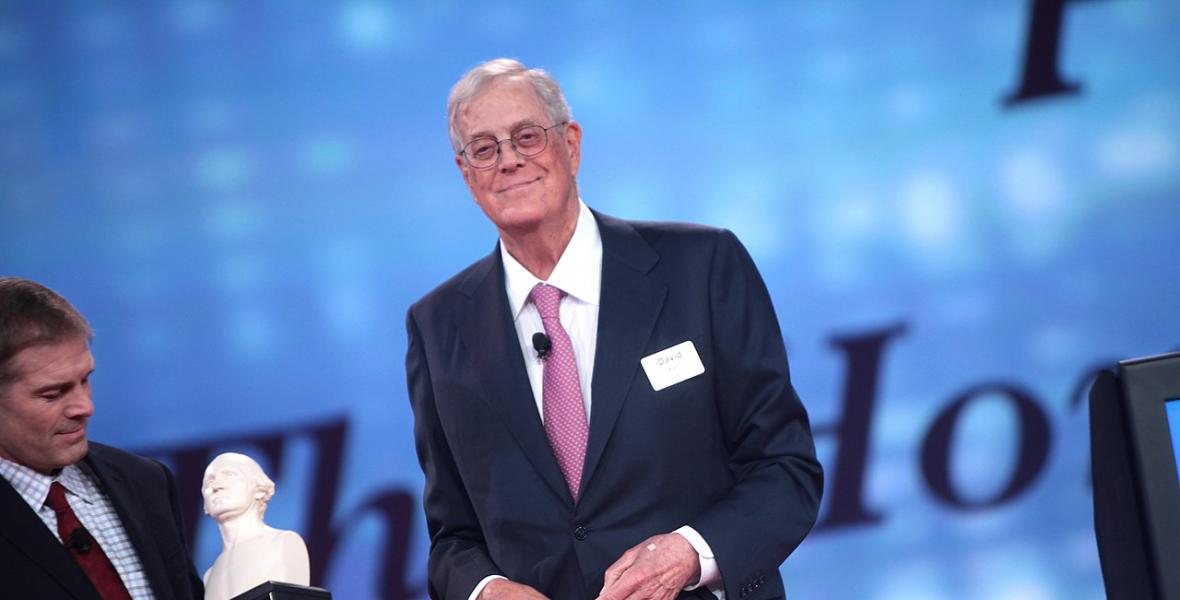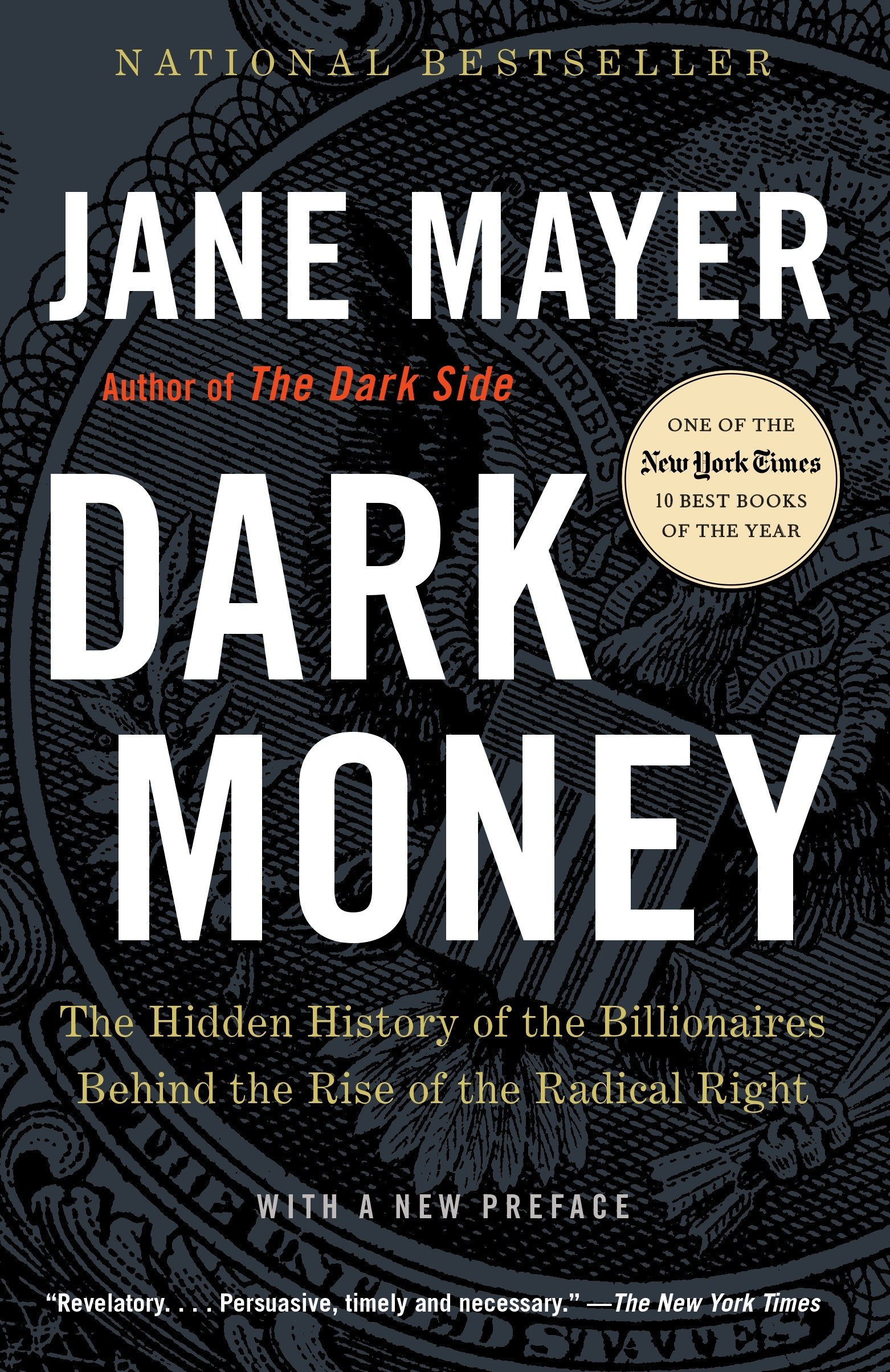Dennis Gruending is an Ottawa-based author and blogger and a former MP. This piece appeared on his Pulpit and Politics blog on August 29, 2019.
-
Evil billionaire industrialist influencer David Koch.
[Image source. Click image to open in new window.]
Newspapers have recently carried obituaries on the death of David Koch, the U.S billionaire. Through Koch Industries, David and his equally wealthy brother Charles controlled the second-largest private corporation in the U.S., with ownership in chemicals, pipelines and fossil fuel extraction. The company was also, until recently, a major investor in Alberta's oil sands and a long-standing backer of right-wing Canadian think-tanks.
Dark Money
According to the book Dark Money a deeply researched book by Jane Mayer, a writer for the New Yorker, the Kochs poured at least $100 million in the U.S. and elsewhere to create a far-right network aimed at influencing elections by promoting chosen conservative candidates, think-tanks and policies. Through an organization called Americans for Prosperity, the Kochs were also major funders of the Tea Party movement, which eventually took control of the Republican Party and moved it hard to the authoritarian right.
Dark Money
Dark Money: The Hidden History of the Billionaires Behind the Rise of the Radical Right (2016) is a non-fiction book written by the American investigative journalist Jane Mayer, about a network of extremely wealthy conservative Republicans, foremost among them Charles and David Koch, who have together funded an array of organizations that work in tandem to influence academic institutions, think tanks, the courts, statehouses, Congress, and the American presidency for their own benefit. Mayer particularly discusses the Koch family and their political activities, along with Richard Mellon Scaife and John M. Olin and the DeVos and Coors families.
[Image source. Click image to open in new window.]The Kochs described themselves as libertarians who wanted government out of the way but their campaigns were also transparently self-interested. The organizations they financed promoted deep tax cuts, a loosening of environmental regulations, attacks on labour unions and support to climate-change deniers. As Mayer writes in Dark Money, "The Kochs vehemently opposed the government taking any action on climate change that would hurt their fossil fuel profits." They also opposed gun laws, an obscenity in the age of El Paso, Parkland, Sandy Hook, and any other number of mass shootings.
Canadian connection
The Kochs also have a significant Canadian connection. Until just recently, a subsidiary [Keystone XL pipeline] of Koch Industries was the largest foreign holder of exploration leases in Alberta's oil sands, with at least 1.1 million acres, an area approximately the size of Prince Edward Island. However, Koch has recently sold most of its oil sands licences to a Calgary-based company.
But the Canadian connection does not end there. The website North 99 says that the Kochs were involved in providing millions of dollars in support to an array of conservative Canadian think-tanks and other organizations which promote a right-wing agenda in this country. Many of these organizations will be familiar to anyone who follows the news. They include the:
-
Manning Centre [rebranded, 2020-06, as the Canada Strong and Free Network, and the
Those groups claim to be independent but they devotedly support conservative causes, and ultimately the Conservative Party led by Andrew Scheer.
Fraser Institute
Among these organizations, the Vancouver-based Fraser Institute is a Koch favourite. Fraser also bills itself as an independent research organization but in fact it regularly produces flawed reports that read more like propaganda than the products of academe.
The research group Desmog sources a study done by Greenpeace USA to show that the Fraser Institute received at least $1.4 million from Koch-related foundations between 1997 and 2017. It is perhaps not surprising that Fraser Institute has used its reports to deny that climate change exists and regularly attacks assessment reports produced by the Intergovernmental Panel on Climate Change.
Hidden donors
The Fraser Institute will not release its list of donors but researchers unearthed information about American benefactors by using U.S. government tax records. Fraser is also listed as a charitable organization in Canada and can provide tax receipts to donors in this country. Incredibly, an organization which regularly attacks government policies on climate change, taxation, public education and medicare has so far apparently escaped scrutiny by the Canada Revenue Agency about its constant right-wing advocacy. This is doubly ironic because many other organizations with charitable status -- including the Suzuki Foundation, Kairos, and the Pembina Institute -- were forced by the CRA to undertake expensive audits during the tenure of the Harper government.
Intimidation
Back then, Harper's energy minister Joe Oliver accused "environmental and other radical groups" of attempting to influence Canadian politics, particularly as related to the construction of pipelines. Oliver and Harper are long gone but their narrative has been picked up by the current Alberta premier. In July 2019, Jason Kenney established a $2.5-million provincial inquiry into, in his words, "foreign-funded special interests" and their campaigns to stop development in the oil sands. He singled out various environmental groups and even alleged that the Pembina Institute had accepted $8 million from foreign interests to oppose and challenge Alberta's energy industry. Pembina promptly denied that accusation, saying that 85 per cent of its revenue comes from Canadian sources.
Look no further
If Kenney is searching for foreigners who meddle in Canadian politics, he need look no further than Koch Industries, ExxonMobil, the John Templeton Foundation, and an array of other foreign organizations and corporations that send millions of dollars a year to the Fraser Institute and the other right-wing think-tanks mentioned earlier in this piece. As the federal election approaches in October [2019], we should view anything those organizations have to say with a good deal of skepticism.
Return to Persagen.com

